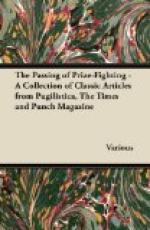UPPER HOUSE COAL COMPANY beg to refer intending purchasers to the accompanying testimonial: “Gentlemen,—Do what I will, I cannot get your coals to light. Put on in sufficient quantity they will extinguish any fire. I have worn out three drawing-room pokers in my endeavours to stir them into a flame, but all to no purpose. Steeped in petroleum, they might possibly ignite in a double-draught furnace, though I fancy they would put it out. They are as you advertise them, a ‘show coal for summer use.’ Don’t send me any more.”
* * * * *
CHARLIE AND SARAH.
DEAR MR. PUNCH,—Why should ARISTOTLE be the only author whose works get discovered? I found the following story, written on papyrus, and enclosed in a copper cylinder, in my back garden, and I am positive that it is not ARISTOTLE. Can it possibly have been written by that amiable and instructive authoress whose stories for children have recently been reprinted? Yours, &c., HENRY ST. OTLE.
CHARLIE was a very obedient little boy, and his sister SARAH was a good, patient little girl. One beautiful summer’s day they went to stay for a week with their Uncle WILLIAM, a man of very high principles, who was not quite used to the proper method with children. On the evening of their arrival, as they were seated in front of the fire, CHARLIE lifted up his bright, obedient, beautiful face, and said, thoughtfully:
“Pray, Uncle WILLIAM, cannot we have one of those instructive and amusing conversations such as children love, about refraction, and relativity, and initial velocity, and Mesopotamia generally?”
“Oh, yes, Uncle WILLIAM!” said SARAH, pausing to wipe her patient little nose; “Our dear Papa is always so pleasant and polysyllabic on these subjects.”
Then Uncle WILLIAM regretted that he had paid less attention in his youth to the shilling science primers, but he pulled himself together and determined to do his best. “Certainly, my dear children, nothing could please me more. Now here I have a jug and a glass. You will observe that I pour some water from the jug into the glass. This illustrates one of the properties of water. Can you tell me what I mean?”
“Fluidity!” said both the children, with enthusiasm.
“Yes, quite so, and—er—er—has a brick fluidity?”
“Why, no, Uncle WILLIAM!”
“Well—er—why hasn’t it?” asked Uncle WILLIAM, with something almost like desperation in his voice.
“That, Uncle,” said the obedient CHARLIE, “is one of the things which we should like to learn from you to-night.”
“Yes, we shall come to that; but, in order to make you understand it better, I must carry my experiment a little further. In this decanter I have what is called whiskey. I pour some of it into the water. Now it is more usual to put the whiskey in first, and the water afterwards. Can you tell me why that is so? Think it out for yourselves.” And Uncle WILLIAM smiled genially.




